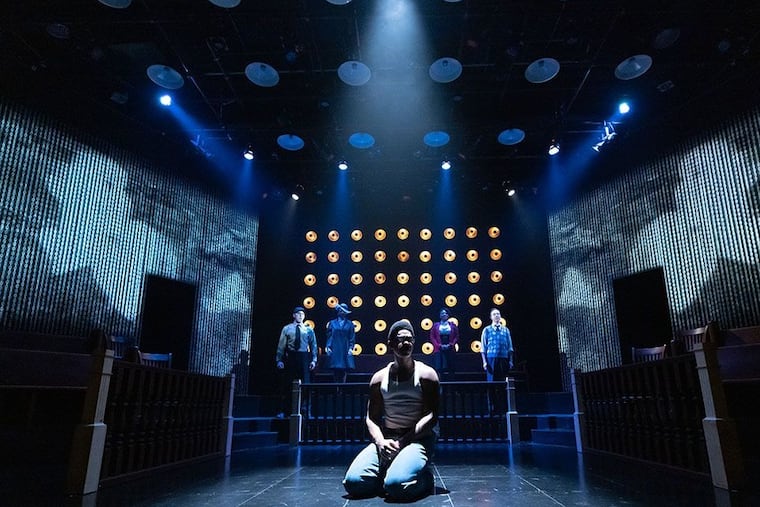‘Bayard Rustin Inside Ashland’ spotlights Black, gay civil rights figure but lacks flow
Bayard Rustin Inside Ashland, a world premiere now at People’s Light theater in Malvern, through June 12, sheds more light on Rustin as a civil and gay rights strategist.

Bayard Rustin’s story needed to be told. He was a Black gay man, a Quaker, and a pacifist, born and raised in West Chester, and the chief organizer of the 1963 March on Washington for Jobs and Freedom.
The world would acclaim the Rev. Martin Luther King Jr., whose “I Have a Dream” speech is forever linked to the historic march.
But few would know about Rustin’s role as its primary architect. He was deputy director under its director, labor leader A. Phillip Randolph.
For decades, Rustin remained a hidden figure, pushed into the shadows because of his sexual identity. Rustin also worked as King’s assistant and helped him form the Southern Christian Leadership Conference.
Black leaders believed Rustin’s identity as an openly gay man who had once been a member of the Communist Party would subject King to rumors and innuendo and jeopardize the movement.
The play, Bayard Rustin Inside Ashland, a world premiere through June 12 at People’s Light in Malvern, is intended to shed light on Rustin’s role as a civil and human rights strategist.
It focuses on the years between 1944 and 1946, when Rustin was sentenced to 28 months at the Ashland Federal Correctional Institution in Kentucky after refusing to be inducted into the Army during World War II because of his pacifist views.
Written and directed by Steve H. Broadnax III, People’s Light resident director, the play stars Reggie D. White as Rustin. The music was arranged and composed by Tony Award-winner, Jason Michael Webb.
Much of the story, of Rustin’s experience in jail, is told through letters.
He corresponds with several people: the prison warden, Hagerman, to demand ending segregation at the jail; A.J. Muste, his boss at the Fellowship of Reconciliation, a peace and justice organization based in New York; and to his lover and partner, Davis Platt.
A lot of the action relies on actors “reading” those letters to the audience.
There are also scenes where Rustin speaks to a ghost-like figure of his biological mother, Florence, with whom he grew up in his grandparents’ home. The Rustin family told him she was his older sister.
While White is convincing as Rustin, and David Watkins is believable as his fellow inmate, Tennessee, much of the dialogue feels clichéd.
One character says the phrase, “When you hurt, I hurt,” at least three times.
And when the warden warns Rustin not to cause trouble, Rustin responds: “Don’t start none, won’t be none.”
This not only seems out of character for Rustin’s eloquent linguistic style, but anachronistic in 1944.
The play is infused with Black spirituals. But the music appears to be intended to provide a measure of safety and comfort, in a story that some audience members may not be comfortable seeing.
It had, after all, been his own Black community that pushed Rustin’s contributions to the background.
Audience members of two shows The Inquirer attended responded positively to the music, from spirituals such as “Sometimes I Feel Like a Motherless Child” and “Nobody Knows the Trouble I’ve Seen.”
They were supposed to illuminate Rustin’s loneliness and anger at his mother, yet these selections felt trite and worn out.
One woman at a Saturday afternoon performance, said, “It seems like every time there is a play about Black people, they have to make it about the church.”
Several theatergoers last Saturday — a day that the West Chester NAACP attended as a group — said they enjoyed the play.
The story seemed disjointed, between the scenes with other inmates and the warden, the dream-like scenes with Florence, and the at-times awkward transitions to the robed church choir members who sing the spirituals.
Rustin was a talented singer who attended college on music scholarships and once sang on Broadway in a show starring Paul Robeson. He recorded an album of spirituals.
The audience is never told why it makes sense that Rustin would want to start a choir. There was an overall lack of flow and coherence with the storytelling.
Early in the play, Rustin’s character is literally made to strip naked before the audience, while partially covered up.
For a minute, there was the imagery of what it was like for an enslaved man to be naked and powerless at a slave auction. Except here, it was the prison officials who are inspecting him and humiliating him.
.
All of the other ensemble cast members gave solid performances: Erik Raymond Johnson as the warden; Price Waldman as Rustin’s pacifist mentor and boss, A.J. Muste; Jesse Corbin as his partner; Eunice Woods as Florence; and Helen Marla White as the funeral singer.
The set design and lighting are effective with pews that give the impression of a church, and lighting that depicts a barbed-wire, fenced-in prison yard, at times filled with inmates.
Yet the play appears didactic, especially in the funeral scenes when cast members, speak directly to the audience with statements about Rustin’s life and why he was important.
Inside Ashland wants to tell Rustin’s story, but a play should be a play, not a lecture.
“Bayard Rustin Inside Ashland” is on the Leonard C. Haas Stage at People’s Light, 39 Conestoga Road, Malvern,. Recommended for ages 17 and up, for explicit sexual language, brief nudity, and adult themes. The box office can be reached at www.peopleslight.org or by phone at 610-644-3500.